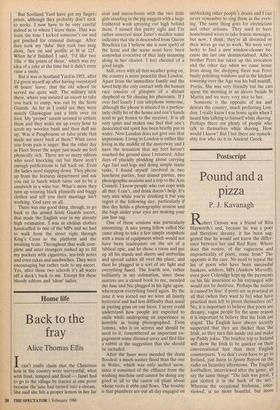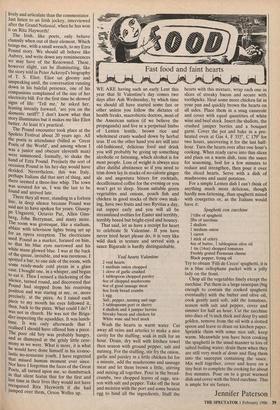Postscript
Pound and a pizza
P. J. Kavanagh
obert Graves was a friend of Rita Hayworth's and, because he was a poet and therefore dreamy, it has been sug- gested that he would not know the differ- ence between her and Red Rum. Where does this notion, of the vagueness and impracticality of poets, come from? The opposite is the case. No need to repeat the list of poets who have been successful bankers, soldiers, MPs (Andrew Marvell); even poor Coleridge kept up the payments on his life insurance so his estranged wife would not be destitute. Perhaps the notion is caused by fear: if poets are as practical as all that (when they want to be) what have practical men left to preen themselves on? No, it is important to believe that poets are dreamy, vague people for the same reason it is important to believe that the Irish are stupid. The English have always secretly suspected that they are thicker than the Irish, so they turn this inside out and make up Paddy jokes. The briefest trip to Ireland will show the Irish to be quicker on their conversational feet than their English counterparts. You don't even have to go to Ireland, just listen to Sports Report on the radio on Saturday afternoons. The English footballers, interviewed after the game, all say the same things: 'The lads was great, I just slotted it in the back of the net.' Whereas the occasional Irishman, inter- viewed, is no more boastful, but more lively and articulate than the commentator. Just listen to an Irish jockey, interviewed after the Grand National, when he has won it on Rita Hayworth!
The Irish, like poets, only behave clumsily when out of their element. Which brings me, with a small wrench, to my Ezra Pound story. We should all behave like Aubrey, and write down any reminiscences we may have of the Renowned. These, however slight, can be illuminating, like the story told in Peter Ackroyd's biography of T. S. Eliot. Eliot sat gloomy and unspeaking until, the conversation running down in his baleful presence, one of his companions complained of the size of her electricity bill. For the first time he showed signs of life: 'Tell me,' he asked her, leaning intently forward, 'are you on the domestic tariff?' I don't know what that story illuminates but it makes me like Eliot better. At least it's practical. The Pound encounter took place at the Spoleto Festival about 20 years ago. All the poets in attendance (billed as 'Great Poets of the World', and among whom I was a junior and obscure eleventh man) were summoned, formally, to shake the hand of Ezra Pound. Precisely the sort of occasion Pound in his hey-day would have derided. Nevertheless, this was Italy, perhaps Italians did that sort of thing, and there seemed a three-line whip. The town was scoured for us, I was the last to be found and arrived late.
There they all were, standing in a forlorn line, in deep silence because Pound was said not to have spoken for years: Giusep- pe Ungaretti, Octavio Paz, Allen Gins- berg, John Berryman, and many more. The room was grotesque, like a stadium, ablaze with television lights being set up for an opera reception. The electricians used Pound as a marker, focused on him, so that his blue eyes narrowed and his white mane glowed blue. I was at the back of the queue, invisible, and was ravenous. I spotted a bar, to one side of the room, with some ready-made cold pizzas in a glass case. I bought one, in a whisper, and began to eat it. Then I sensed a thickening of the silence, turned round, and discovered that Pound had stepped from his receiving position and was staring at me, or, more precisely, at the pizza. As I raised each piece to my mouth his eyes followed it, then, back to the pizza. What could I do? I was not in church. He was not the Briga- dier inspecting the squaddies. It was lunch- time. It was only afterwards that I realised I should have offered him a piece. The poor old boy was probably hungry, and as dismayed at the grisly little cere- mony as we were. What is more, it is what he would have done himself in his iconoc- lastic no-nonsense youth. I have regretted that missed human moment ever since. Nor have I forgotten the faces of the Great Poets, all turned upon me, so dumbstruck in that silent hiatus that for the first and last time in their lives they would not have recognised Rita Hayworth if she had jumped over them, Orson Welles up.















































 Previous page
Previous page